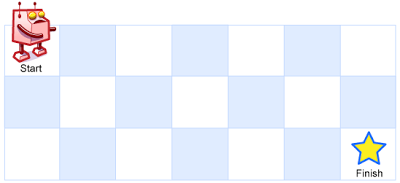source: https://leetcode.com/problems/unique-paths/
C/C++ Solution to LeetCode problem 62. Unique Paths.
Problem
There is a robot on an m x n grid. The robot is initially located at the top-left corner (i.e., grid[0][0]). The robot tries to move to the bottom-right corner (i.e., grid[m - 1][n - 1]). The robot can only move either down or right at any point in time.
Given the two integers m and n, return the number of possible unique paths that the robot can take to reach the bottom-right corner.
The test cases are generated so that the answer will be less than or equal to 2 * 109.
Examples
Example 1:
Input: m = 3, n = 7
Output: 28
Example 2:
Input: m = 3, n = 2
Output: 3
Explanation: From the top-left corner, there are a total of 3 ways to reach the bottom-right corner:
- Right -> Down -> Down
- Down -> Down -> Right
- Down -> Right -> Down
Constraints
1 <= m, n <= 100
Solution
This can be solved using dynamic programing (either recursive or iterative).
- We can use a map to memoize the results, but that makes it slower, so, we will allocate a vector of vectors (representing the board).
- The iterative version is a shorter solution.
Solution 1:
1
2
3
4
5
6
7
8
9
10
11
12
13
14
15
16
17
18
19
20
21
22
23
24
25
26
class Solution {
vector<vector<int>> dp;
private:
int paths(int m, int n, int r, int c) {
if (r+1 == m && c+1 == n)
return 1;
if (r == m || c == n)
return 0;
if (dp[r][c] != 0)
return dp[r][c];
dp[r][c] = 0;
dp[r][c] += paths(m, n, r + 1, c);
dp[r][c] += paths(m, n, r, c + 1);
return dp[r][c];
}
public:
int uniquePaths(int m, int n) {
dp = vector(m, vector<int>(n, 0));
int r = paths(m, n, 0, 0);
return r;
}
};
Solution 2:
1
2
3
4
5
6
7
8
9
10
11
12
13
class Solution {
public:
int uniquePaths(int m, int n) {
dp = vector(m, vector<int>(n, 1));
for (int r=1; r<m; r++) {
for (int c=1 ; c<n; c++)
dp[r][c] = dp[r][c-1] + dp[r-1][c];
}
return dp[m-1][n-1];
}
};

